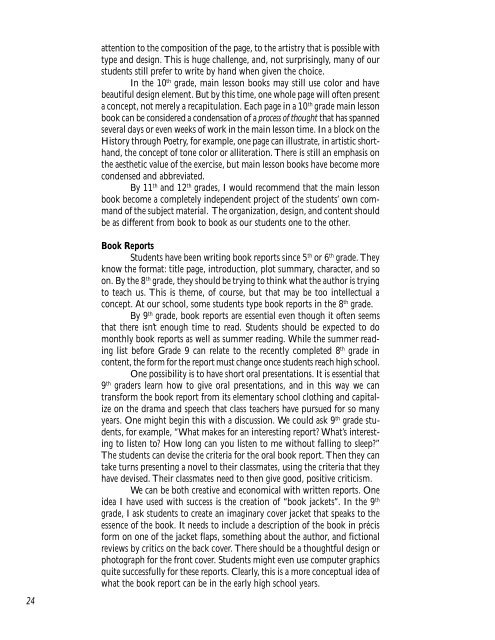Colloquium on English - Research Institute for Waldorf Education
Colloquium on English - Research Institute for Waldorf Education
Colloquium on English - Research Institute for Waldorf Education
You also want an ePaper? Increase the reach of your titles
YUMPU automatically turns print PDFs into web optimized ePapers that Google loves.
24<br />
attenti<strong>on</strong> to the compositi<strong>on</strong> of the page, to the artistry that is possible with<br />
type and design. This is huge challenge, and, not surprisingly, many of our<br />
students still prefer to write by hand when given the choice.<br />
In the 10 th grade, main less<strong>on</strong> books may still use color and have<br />
beautiful design element. But by this time, <strong>on</strong>e whole page will often present<br />
a c<strong>on</strong>cept, not merely a recapitulati<strong>on</strong>. Each page in a 10 th grade main less<strong>on</strong><br />
book can be c<strong>on</strong>sidered a c<strong>on</strong>densati<strong>on</strong> of a process of thought that has spanned<br />
several days or even weeks of work in the main less<strong>on</strong> time. In a block <strong>on</strong> the<br />
History through Poetry, <strong>for</strong> example, <strong>on</strong>e page can illustrate, in artistic shorthand,<br />
the c<strong>on</strong>cept of t<strong>on</strong>e color or alliterati<strong>on</strong>. There is still an emphasis <strong>on</strong><br />
the aesthetic value of the exercise, but main less<strong>on</strong> books have become more<br />
c<strong>on</strong>densed and abbreviated.<br />
By 11 th and 12 th grades, I would recommend that the main less<strong>on</strong><br />
book become a completely independent project of the students’ own command<br />
of the subject material. The organizati<strong>on</strong>, design, and c<strong>on</strong>tent should<br />
be as different from book to book as our students <strong>on</strong>e to the other.<br />
Book Reports<br />
Students have been writing book reports since 5 th or 6 th grade. They<br />
know the <strong>for</strong>mat: title page, introducti<strong>on</strong>, plot summary, character, and so<br />
<strong>on</strong>. By the 8 th grade, they should be trying to think what the author is trying<br />
to teach us. This is theme, of course, but that may be too intellectual a<br />
c<strong>on</strong>cept. At our school, some students type book reports in the 8 th grade.<br />
By 9 th grade, book reports are essential even though it often seems<br />
that there isn’t enough time to read. Students should be expected to do<br />
m<strong>on</strong>thly book reports as well as summer reading. While the summer reading<br />
list be<strong>for</strong>e Grade 9 can relate to the recently completed 8 th grade in<br />
c<strong>on</strong>tent, the <strong>for</strong>m <strong>for</strong> the report must change <strong>on</strong>ce students reach high school.<br />
One possibility is to have short oral presentati<strong>on</strong>s. It is essential that<br />
9 th graders learn how to give oral presentati<strong>on</strong>s, and in this way we can<br />
trans<strong>for</strong>m the book report from its elementary school clothing and capitalize<br />
<strong>on</strong> the drama and speech that class teachers have pursued <strong>for</strong> so many<br />
years. One might begin this with a discussi<strong>on</strong>. We could ask 9 th grade students,<br />
<strong>for</strong> example, “What makes <strong>for</strong> an interesting report? What’s interesting<br />
to listen to? How l<strong>on</strong>g can you listen to me without falling to sleep?”<br />
The students can devise the criteria <strong>for</strong> the oral book report. Then they can<br />
take turns presenting a novel to their classmates, using the criteria that they<br />
have devised. Their classmates need to then give good, positive criticism.<br />
We can be both creative and ec<strong>on</strong>omical with written reports. One<br />
idea I have used with success is the creati<strong>on</strong> of “book jackets”. In the 9 th<br />
grade, I ask students to create an imaginary cover jacket that speaks to the<br />
essence of the book. It needs to include a descripti<strong>on</strong> of the book in précis<br />
<strong>for</strong>m <strong>on</strong> <strong>on</strong>e of the jacket flaps, something about the author, and ficti<strong>on</strong>al<br />
reviews by critics <strong>on</strong> the back cover. There should be a thoughtful design or<br />
photograph <strong>for</strong> the fr<strong>on</strong>t cover. Students might even use computer graphics<br />
quite successfully <strong>for</strong> these reports. Clearly, this is a more c<strong>on</strong>ceptual idea of<br />
what the book report can be in the early high school years.

















